There are over 1.5 billion web sites in the world, and JavaScript is used on 95% of them.
With no additional introduction on the importance of performing an in-depth SEO analysis on your site, regardless of the language programming it uses, we are proud to tell you that starting today, cognitiveSEO can crawl and perform in-depth site audits on all type of websites, JavaScript generated sites included.
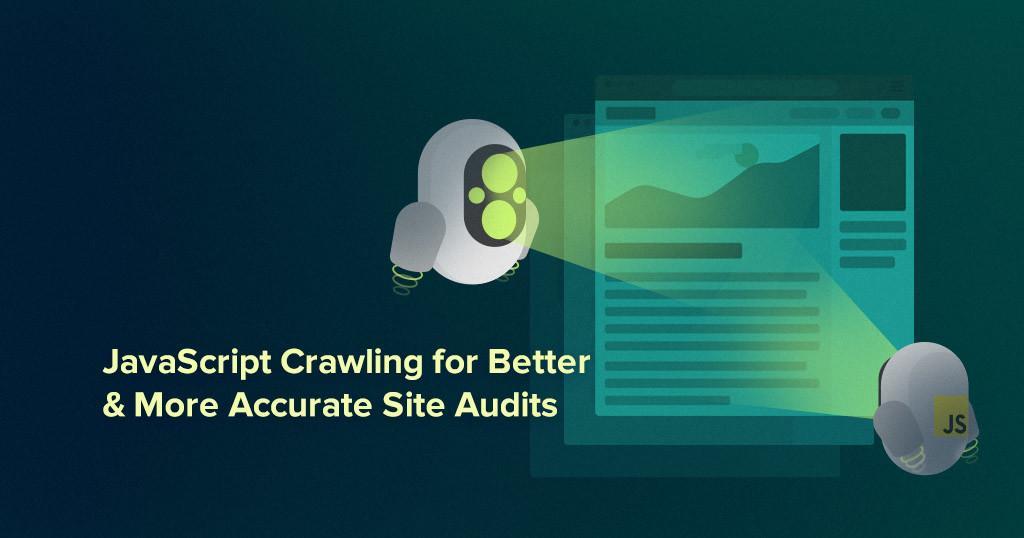
With so many sites using content generated with JavaScript, you might feel that there is no need to highlight the importance of JS. Yet, with so many changes happening in the world wide web, it is safe to assume that one might not be up to date with everything that is happening in web development. However, using JavaScript highly impacts a business and its SEO strategy; therefore, being able to run site audits on all type of sites is a must these days.
So, indulge us to talk a bit about the importance of JavaScript Crawling, about how to run a site audit on JS generated sites within cognitiveSEO and how JavaScript affects SEO.
Find All Possible SEO Issues on JavaScript Websites
As we mentioned before, cognitiveSEO has just added a brand new feature: the possibility of crawling & analyzing JavaScript websites.
You can find all the possible technical and SEO issues a site may have and get recommendations on how to fix them.
cognitiveSEO’s Site Audit analyzes the technical health of your JavaScript website and helps you detect all the weak points of your website before your users do, giving you a competitive advantage on the competitive market we are swimming in. The SEO Audit Tool crawls all the pages it finds on a website, be it JavaScript or not, regardless of the size of your website, and provides a fully customized set of data easy to comprehend and visualize.
The truth is that with the ever-evolving search engines algorithms you need an efficient solution to keep your rankings safe. And cognitiveSEO does exactly that: it lets you know all the issues that might prevent your online business from getting the organic traffic and the high rankings you deserve.
You can set JavaScript crawling for any site with literally one click: simply enable the JavaScript crawling functionality from the editing section and you’re all set.
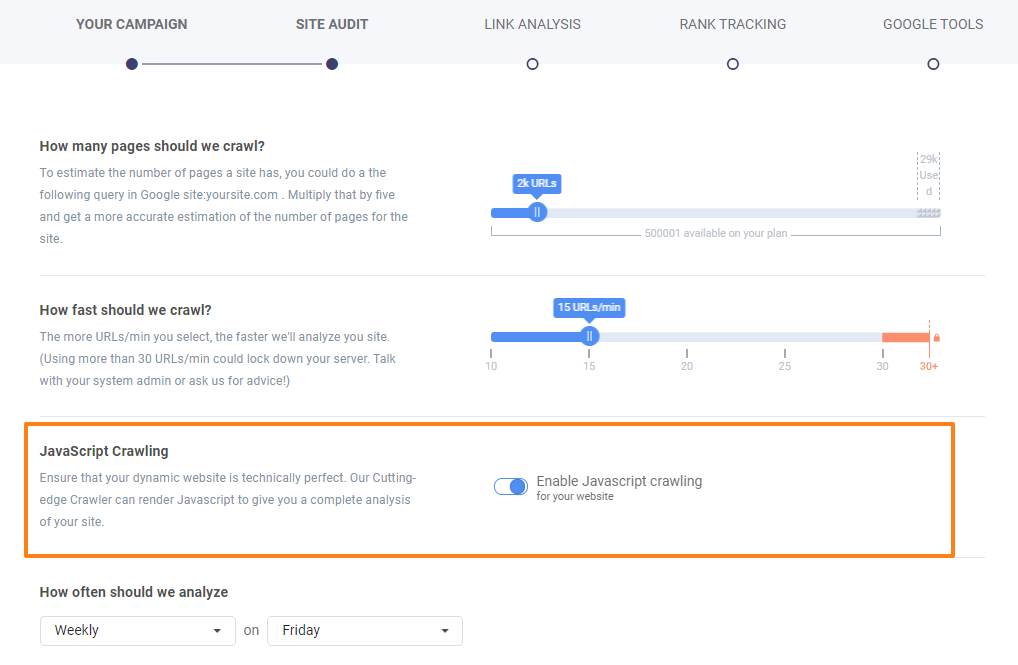
Of course, along with this functionality there are dozens of other customizations you can add to your site audit so it can best respond to your needs: crawl structure, when to crawl, what to crawl, crawl sources, etc. Anything you need to perform a site audit as accurate and reliable as possible.
Performing a complete JavaSscript website audit will give you a deeper understanding of why your site is not generating the organic traffic you think it should or why your sales and conversions are not improving. This kind of website audit gives you a much wider array of SEO items to look at and can analyze issues of all types that might prevent you from reaching your best possible ranking.
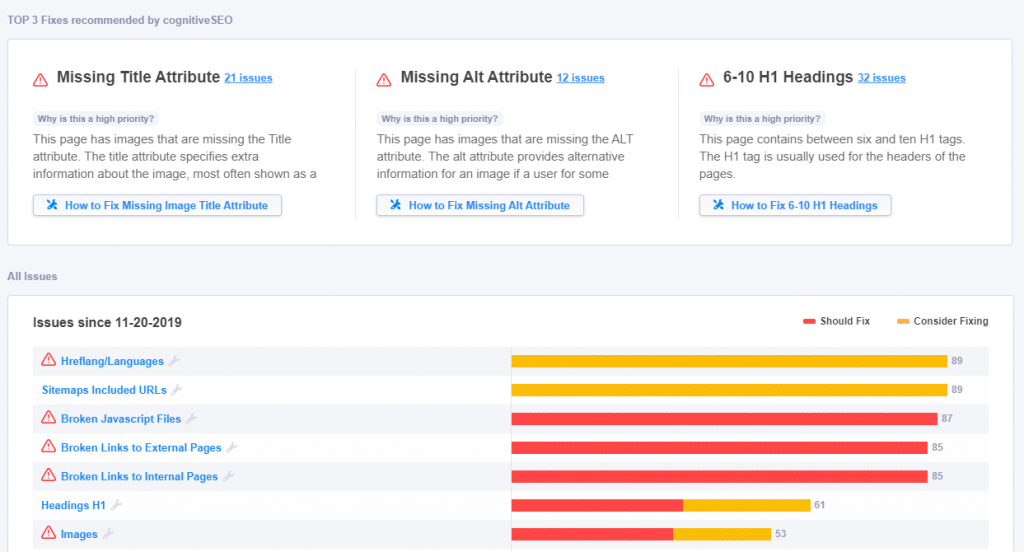
Why Is JavaScript Crawling So Important?
There are tons of websites using JS and it’s easy to understand why this happens. Using JavaScript in designing and building websites is very popular as it makes it possible to create interactive and dynamic content. Visual animations, navigation, displaying dynamic content to users based on specific behaviors are just a few of the things that can be done with JavaScript.
Yet, analyzing a JavaScript website is not always a walk in the park. It requires a lots of resources and in-depth analyses. Luckily, you don’t need to worry about this anymore as you can run complete Site Audits within cognitiveSEO, on all types of websites.
Here are just some of the advantages of enabling JavaScript crawling when running a Site Audit:
You’ll get a more accurate analysis and you’ll have a better issues identification.
Many sites use JavaScript generated content, be it completely or partially. Even if your site has only a couple of elements generated with JS, it is highly important to get those sections analyzed as well. It’s always the small pieces that make the bigger picture.
You can find out how crawlable your pages are with and without JavaScript rendering enabled.
JavaScript analysis is the closest thing you get to what your users actually see within their browsers. You can run an SEO audit, with and without JS enabled and see the differences for yourself.
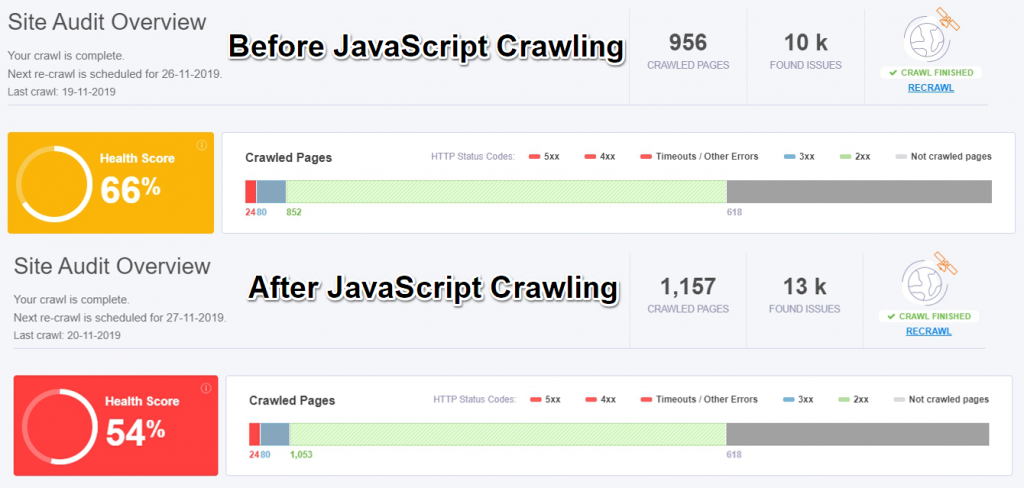
You can analyze a wider range of websites.
So, let’s say that you want a really cool site template, with a dandy interface, so you choose to create your site using Wix, for instance. That’s awesome! The downside is that in most of the instances you’ll hardly find possibilities of completely analyzing all the technical and SEO issues your site might have. Yet, the JavaScript crawling gets things done for you, allowing you to analyze sites built with different platforms and programming languages.
What Is JavaScript and How Does it Work?
JavaScript is one of the most popular programming languages to develop websites. It uses frameworks to create interactive web pages by controlling the behavior of different elements on the page.
Initially, JS frameworks were implemented client-side (front-end) only in browsers, but now the code is embedded in other host software, such as server-side (back-end) in web servers and databases, which will save you from a lot of trouble and pain. The problems started when JavaScript implementation relied only on client-side rendering.
If JavaScript frameworks have server-side rendering, you’ve already solved the problem before it even arises. To better understand exactly why problems appear and how you can avoid them, it is important to have some basic knowledge on how search engines work. For that, we need to establish the phases of the information retrieval process: crawling, indexing and ranking.
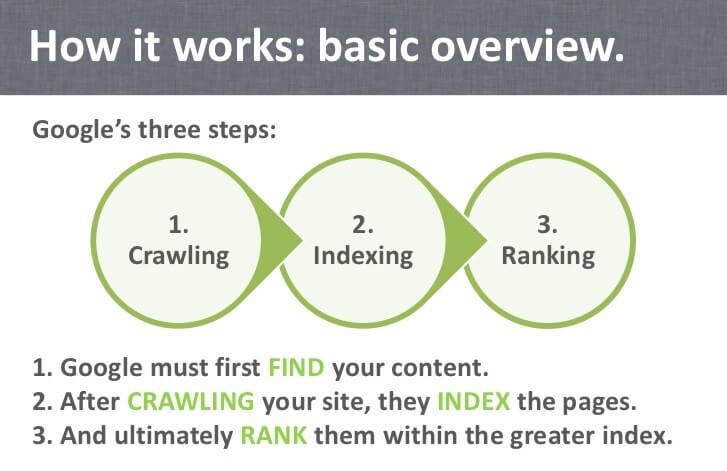
How JavaScript Affects SEO
If you want to find out more about the impact of JavaScript on SEO, you need to know that we wrote a more exhaustive piece of content on JavaScript and SEO.
JavaScript means more loading time speed and faster server load (code functions run immediately instead of waiting for the server to answer), easier implementation, richer interfaces and higher versatility (can be used in a huge variety of applications). But JavaScript SEO brings some problems along the way. Lots of webmasters fail to optimize the content that uses JavaScript code. And this is (most likely) because they don’t have a complete site audit overview.
Everybody started to doubt whether search engines, like Google, are able to crawl JavaScript. And that was the wrong question to ask. The better question to ask is can search engines parse and understand the content rendered by Javascript? In other words, can Google rank your website if it’s made in JavaScript? The truth is that more and more websites are relying on JavaScript, so search engines have improved their page rendering functionality.
Even if not completely maybe, it’s important to know that Google is able to crawl and index the rendered version of pages as well as the HTML version.
So, the questions that pop out are:
- “Does Google crawl JavaScript?” The answer is more and more lately.
- “Does Google index JavaScript?” The answer is yes.
- “Should I use JavaScript?” The answer is it depends on your needs.
A JS website is indexed and ranked. We’ve learned things the hard way until now. We know that making it easier for Google to understand the generated content is the best approach. To help Google rank content that uses JavaScript, you need tools and plugins to make it SEO friendly. And you need a comprehensive SEO analysis to make sure your site is performing as well as it can.
It’s not all sunshine and roses, we know. You need to know that JavaScript uses up crawl budget as Google requires more resources to render, crawl and index JS websites, adding a layer of complexity to the process. Moreover, JavaScript can be hard to combine with good SEO.
Yet, regardless of all these matters, keep in mind that a good SEO Audit can save you from lots of bigger troubles; and since you now have the possibility of performing audits on all types of sites, JS included, you have no excuses for not performing a Site Audit right now.
The post JavaScript Crawling for Better & More Accurate Site Audits appeared first on SEO Blog | cognitiveSEO Blog on SEO Tactics & Strategies.
Via Marketing http://www.rssmix.com/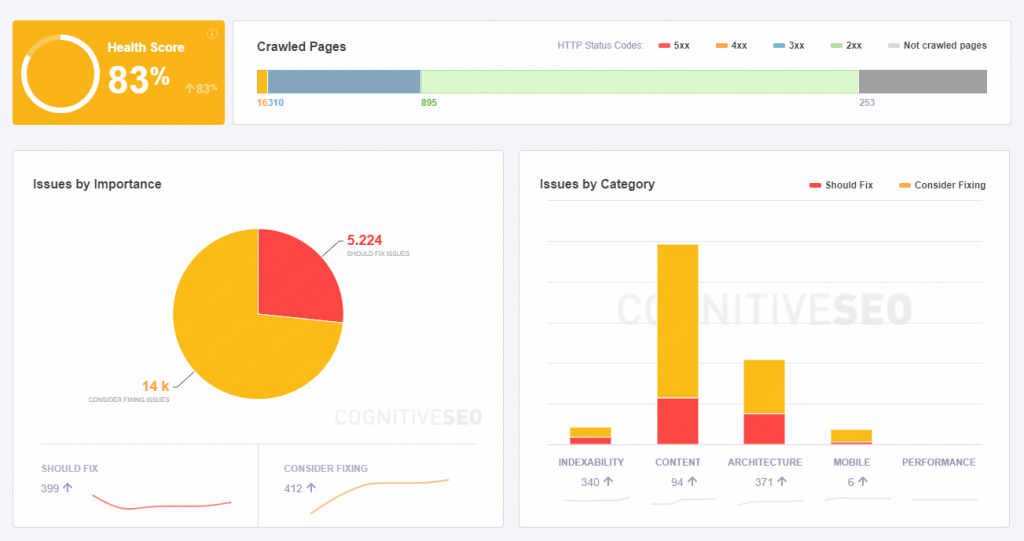

No comments:
Post a Comment